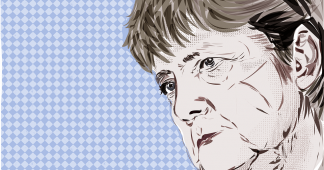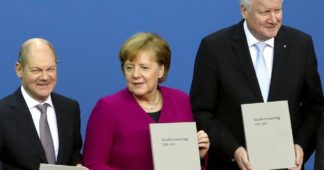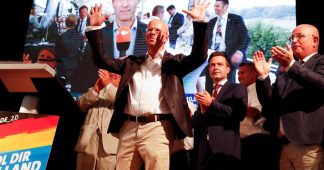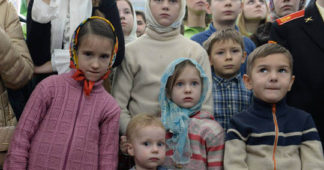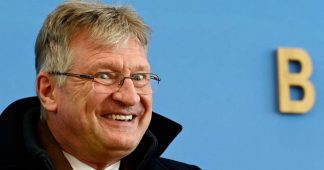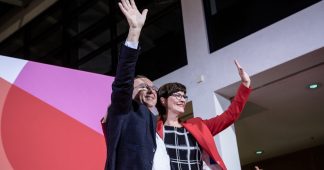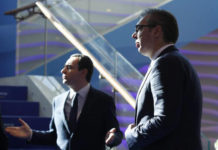By Nikolaos Alexatos
The recent developments in Germany due to the ongoing conflict in the Ukraine, both at a political and social level, are making the gaps in narrative from the media and society decidedly apparent. A key global powerhouse and major export nation, Germany has found itself unfavorably exposed by a situation which will likely drag on for some time. How can its present stance consolidate the international markets that its economy is so dependent on? How will the changing public opinion affect Scholz’s already fragile hold on power?
The Government
The present German government is an alliance between three parties: the Social Democrats (SPD), the Greens and the Liberals (FDP). It is the first time in the history of the Federal Republic that the chancellor has, in reality, such hold on power. The reason being, that although the party won the elections, it has only done so with a small percentage of votes. This is a new shift from when Merkel won 33% of the vote in 2017.
In Merkel’s case, she managed to have cross-party appeal by taking and implementing policies from second and third parties. This tactic allowed her and the CDU to rule relatively successfully until her party, with the leadership of Armin Laschet, lost the elections of September 2021.
Olaf Scholz’s party has managed to turn the game around. Before the 2021 elections, polls showed the SPD, the oldest German party, coming third at 12%. Subsequently, his party managed to win the elections with a mere 26 % of votes. Moreover, Merkel managed to govern during her last term in office thanks to the political power she had established since 2005, when she became chancellor for the first time. On the other hand, the SPD was elected in September 2021 by one fourth of the voters, as a result, the current chancellor’s hold onto power could reveal itself to be quite fragile.
The three alliance parties hold conflicted views on the handling of the ongoing Ukrainian issue. Even if Scholz, as the head of government, is actively invested in imposing sanctions on the Russian Federation, and his rhetoric against Russia and President Putin remains aligned with conventional western rhetoric, a detailed look and analysis shows that he has a relatively moderate position. The war in Georgia in 2008 altered Russian-German relations, effectively with the outcome of having Germany distance itself from Russia, not so much economically as politically. Its position towards the Ukraine, specifically the Euro-Maidan protests and the consequent coup that overthrew elected President Yanukovych, conveniently benefited Germany in assuring more influence in the region, which meant keeping a grip on the East and the borders with Russia, hence cementing more distance to Russia. Yet, as the conflict escalated on the 24th February, Scholz – whose party controls the defense ministry – sided with the moderates instead of pro-conflict sides in Germany as well as western coalitions (EU and NATO).
Despite being invited, Scholz has not paid a diplomatic visit to Kiev and bilateral relations, already lukewarm, have suffered. Kiev’s disapproval is apparently expressed in their criticism of Berlin’s reluctance to send heavy artillery and tanks although having previously committed to doing so. At the same time Poland accuses Germany of breaking its promise to replace the tanks that Warsaw delivered to the Ukrainian Army (200 soviet T-72), which they are still waiting for. In addition, Germany (Scholz) hasn’t yet implemented sanctions, specifically on oil and gas, continuing its dependency on Russian fossil fuels even having to pay for it p in rubles, thus helping in strengthening Russia’s currency and economy.
The other two parties of the governing coalition remain pro-conflict, as was seen during Foreign Minister Annalena Baerbock’s visit to Kiev, where she expressed a hard position towards Russia. Robert Habeck, Federal Minister for Economic Affairs, member of the Green party, has also relentlessly pleaded for an oil embargo and German as well as EU independence from Russian fossil fuels. Their efforts are in vain as energy supplies have been established for decades and Germany cannot afford to veer policy at this moment in time, already Germany’s producer price inflation topped 30% in March 2022, the highest it’s been in 73 years, when the agency began collecting data.
Likewise, the Liberals (FDP) maintain a pro-conflict standpoint. A few weeks ago, as Scholz held a meeting with the parliamentary commission for defense affairs, informing MPs about developments concerning the Ukraine, FDP MPs vacated the space accusing the chancellor of avoiding answering concrete questions regarding the supply of artillery and tanks to the Ukraine. The Chancellor, avoiding the Ukrainian arms topic, chose to speak about Germany’s strategic position and relations in the world with emphasis on the Global South and its significance for Germany’s future. and the significance of the relations to the “Global South”. The FDP MPs, in protest, left the meeting abruptly accusing the chancellor of trying to fool them, the specific german word they used was “verarschen”. But was the chancellor really playing a fool’s game?
The Society
The answer to the previous question is likely no. Soon after Russia’s operation in the Ukraine, crowds descended in mass onto major squares and avenues in many German cities protesting Russian policy. Fortyfive days later households and industry recognized that a direct confrontation with Moscow would come at a terrible cost, and in late April, public opinion began to contemplate the possibility of a nuclear war. At the same time, the disruption to the supply chains from the conflict and sanctions began to take a toll on the economy. Inevitably, reality hit when inflation, shortages and the fear of a nuclear disaster became apparent, and most protesters ran out of steam. Public opinion has mainly shifted from supporting an offensive to reaching a diplomatic solution, through a German initiative. This shift in opinion was strongly triggered by Jürgen Habermas and Alice Schwarzer, two prominent intellectuals, who supported an end to the conflict, even if this meant Ukrainian territorial losses. Henry Kissinger and the NYT would follow and call for the same action one month later.
After the toll taken on society, public discourse is leaning towards a diplomatic resolution and swift end to the conflict. This was made evident on the 1st of May when the Chancellor spoke at a rally in Düsseldorf and his audience, mainly social democrats, began booing him and shouting for restrained policy towards Russia and any further interference in the Ukrainian conflict. The same happened in Berlin when the mayor took the stand and didn’t manage to finish her speech because of the opposing crowds.
This is also represented, although not entirely, in both right and left leaning political parties. For example, some in Die Linke support Putin’s conviction for not upholding international law, and some, as Oskar Lafontaine, who has subsequently left the party, maintain that this conflict is NATO’s responsibility. The AfD, on the extreme right, holds a similar stance. Approving or not of Moscow’s policy and military operation, it is commonly discussed on media sites and social media that NATO has its own stake in the escalation of the conflict. This discourse articulates the main concern of German society; that after two years of a pandemic which caused gravely affected social and economical activity, can Germans bear to cut ties with a long time partner such as Russia?
Simply put, they can not, in fact it is excruciating. The immediate consequences along with the bleak future perspectives veer Germans in favor of a diplomatic solution and careful management of the situation. This stance is expressed both horizontally and vertically. The problems of inflation, energy security, food supplies and the prompt fear of a nuclear war are important concerns for the working class and industry, and for the whole of society.
To conclude, by keeping these discrepancies between politics and society in mind, Scholz’s dilemma is better understood and hopefully, a Gordian Knot Germany can untie itself from.
We remind our readers that publication of articles on our site does not mean that we agree with what is written. Our policy is to publish anything which we consider of interest, so as to assist our readers in forming their opinions. Sometimes we even publish articles with which we totally disagree, since we believe it is important for our readers to be informed on as wide a spectrum of views as possible.
